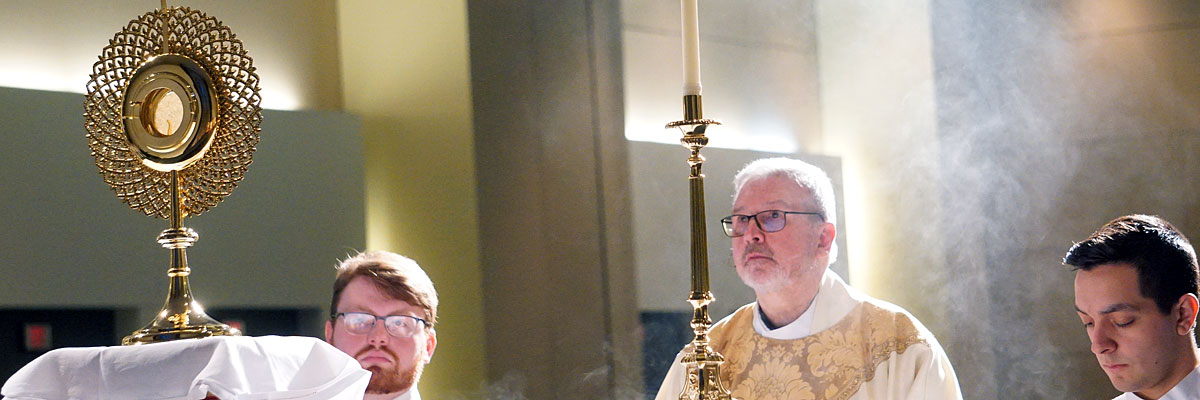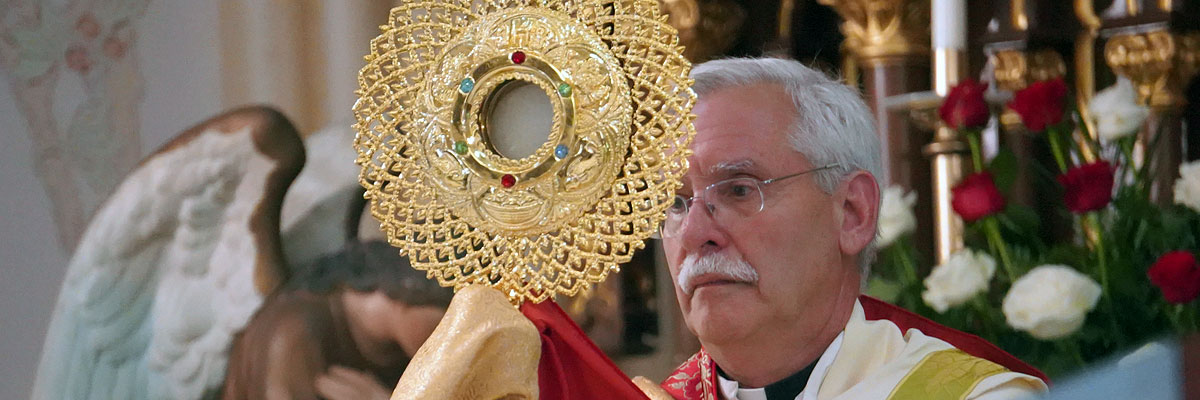Official Website of the
Catholic Diocese of Little Rock
18th Sunday in Ordinary Time, Year B 2021
Published: August 1, 2021
Bishop Anthony B. Taylor preached the following homily at St. Mary Church in Helena in celebration of Father James Ibeh's 25th anniversary of priesthood on Sunday, Aug. 1, 2021.

Bishop Taylor
The Gospel reading we have today is just perfect for our celebration of Father James Ibeh’s 25th anniversary of ordination to the priesthood. It comes from Jesus’ Bread of Life discourse in which Jesus unpacks for us the meaning of the Eucharist and consequently also the priesthood. In this passage the crowds ask Jesus a series of questions. But Jesus doesn't answer the questions they ask. Instead he uses word play to introduce people to thoughts they had never thought before.
The Gospel begins with the crowds tracking Jesus down on the other side of the lake. They ask him: "Rabbi, when did you come here?" Jesus doesn't answer this question ... who cares when? He answers instead the question they should have been asking, not when but why? Why have they gone to all this trouble to track him down in the first place?
They have just experienced the miracle of the feeding of the 5,000. Now, what does it mean? Jesus says, "I assure you, you are not looking for me because you have seen signs, but because you have eaten your fill of the loaves.” They are not interested in the sign, the who and the why, or even the "when" despite the fact that that's the initial question they ask.
Jesus explains: "I myself am the Bread of Life. No one who comes to me shall ever be hungry, no one who believes in me shall ever thirst again.” The symbol of the manna is fulfilled in Jesus. Eat manna and you live one day longer, eat the Bread of Life and you live forever!
What they are really interested in is the "how.” They think that if they knew how he multiplied those loaves, they could do the same and so never have to work again. They want to be able to perform such works of God themselves, for their own earthly material benefit. So Jesus pivots the conversation, gets it moving in a different direction by playing a little with the word "bread," which has a double meaning here, just as it often does in English.
If your son says, "I need a little bread" you know he is talking about money, not Wonder bread. Similarly, "bread" here means not only physical nourishment — food, but also spiritual nourishment — Jesus' teachings, and as we will soon learn, most especially the Eucharist. Jesus challenges the crowd to raise their minds from earthly concerns (how to get bread), to those much more important concerns that lead to eternal life. They should seek this spiritual bread with at least the same desire and effort that they invest in working for perishable earthly bread.
So when they ask how they can perform such "works of God" themselves, Jesus uses a little more word play. Only God can work such miracles. What they can do is get with the program: have faith in Jesus, the one whom God has sent. But here again we have a phrase with multiple meanings. "Believe him" is not the same as "believe in him.”
People ask for another sign to prove what Jesus is saying, so that they can believe him; credit the accuracy of his information. But Jesus is asking them not just to believe him, but to believe in him: to put faith in him personally, to entrust themselves to him, to believe in him like they believe in God. You believe a prophet, his message — but you believe in God, in his very self.
And the people do already think Jesus is a prophet, maybe even the Messiah. There was a popular belief at the time that when the Messiah came, God would once again feed them with manna from heaven, just like he did in the time of Moses. So next the people ask for a sign like the manna God gave through Moses: that would prove that Jesus is the Messiah.
But Jesus counters that the manna they are talking about is not as big a deal as they think it is: Manna was heavenly bread only in the sense that heaven was where it came from. In every other sense it was earthly; temporary physical nourishment. A few hours after eating manna the hunger returns. Jesus can do a lot better than that and this is the big point he's leading up to, namely that he — his very person — is the true bread from heaven that gives real life to the world; unending spiritual nourishment.
And get this, not only does he give that bread (like God did in the time of Moses), he also is that bread that satisfies every hunger forever. Jesus explains: "I myself am the Bread of Life. No one who comes to me shall ever be hungry, no one who believes in me shall ever thirst again.” The symbol of the manna is fulfilled in Jesus. Eat manna and you live one day longer, eat the Bread of Life and you live forever!
Twenty-five years ago Father James Ibeh was ordained a priest and thus given the power to make this same Bread of Life available to you, his parishioners here in the Arkansas delta. He became what we call an “alter Christus,” Latin for “another Christ” and he has dedicated the best years of his life to serving the Lord by serving you.
Thanks to the Eucharist that you receive through his ministry, you are fed with bread from heaven greater than that with which the Hebrews were fed during their 40-year sojourn in the desert. Father James is one of 44 missionary priests from outside the United States — about one-third of all our priests in active ministry without which — even with all our recent ordinations — we would not be able to offer Mass every weekend in all 130 of our churches here in Arkansas.
And I hope that everyone here realizes what a great sacrifice our missionaries make — leaving behind their family and friends, their culture and language and the foods that taste of home. I spent a summer in Kenya in 1979 and experienced how lonely it can be to come to a new place where culturally you are an outsider and have to learn a whole new way of doing things.
So Father Ibeh, we are grateful to you! We thank God for your priesthood and for sending you to us here in Arkansas and for all the sacrifices you make to provide us the Bread of Life we receive every time we celebrate the Eucharist.








